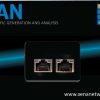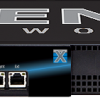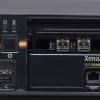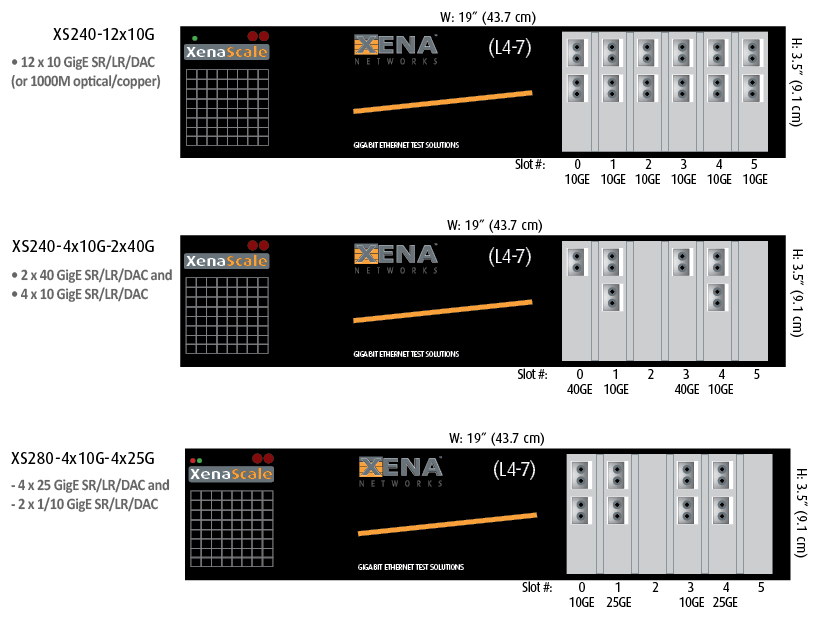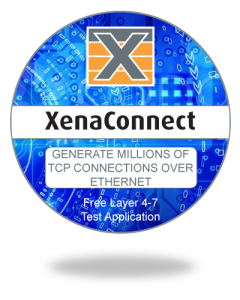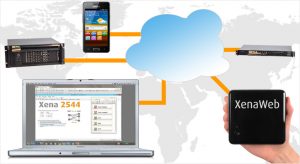Xena’s L4-7 Test Platform offers stateful end-to-end testing of network appliances such as switches, firewalls, routers, NAT routers, proxies, load-balancers, bandwidth shapers, and more. The platform is also suitable to characterize entire network infrastructure performance for TCP.
Developers of Ethernet-based network appliances can measure connection establishment and teardown rates, packet forwarding rate at large numbers of connections and identify performance bottlenecks. The platform is also ideal for rapid validation of performance or regression testing.
Developers of TCP-based application servers such as web- and FTP servers can measure TCP connection rates and verify robustness against TCP SYN attacks. HTTP get blasting can be used to verify web server performance and robustness.
A MS Windows desktop application (XenaConnect) is included for ad-hoc test execution and remote management of test equipment located in multiple locations. Xena also offers an open scripting API (XenaScripting) for automating testing from any scripting environment.
The Xena L4-7 stateful TCP Test Platform provides a wide range of copper and optical interfaces ranging from 1 Gigabit to 40 Gigabit Ethernet in various port densities.
Chassis/Models/Interfaces
The Xena L4-7 platform is available in two models designed to suit different performance requirements:
- XenaAppliance [4 Packet Engines]
A small portable chassis that can hold one Layer 4-7 network interface card and one Layer 2-3 test module (optional).
- XenaScale [24 Packet Engines]
A 19” rack mountable chassis with up to six Layer 4-7 network interface cards.
The Packet Engines in each chassis can be flexibly assigned to one or more ports. While default behavior is for each port to use 1/N’th of the available PE’s, multiple PE’s can be allocated to a single port for maximum performance for a given application.
Both Xena L4-7 chassis are fast, reliable and rugged, based on Linux and equipped with solid state hard drives for speed and robustness.
Software
The Xena L4-7 platform comes complete with XenaConnect, a software application with an intuitive user-interface that makes it easy to install, connect and simulate high volumes of realistic TCP traffic, and then analyze and document the results.
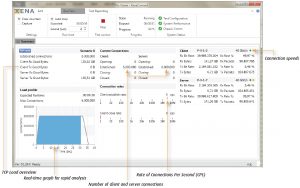
API scripting from any tool environment
XenaScripting is a free text-based Command Line Interface (CLI) API that makes test automation easy to script from any scripting environment that supports TCP/IP. (Available from Xena’s website).
Test Applications
The Xena L4-7 platform is scalable and can be used to quickly and easily generate millions of TCP flows with specified load profiles and configurable IP/TCP/Payload parameters. Real time stats and test reports provides an overview of the system or device characteristics.
Xena’s L4-7 test modules are suited for multi-user environments at the level of per-port reservation. Packet Engines (PE’s) can be reserved and allocated individually, depending on the test scenario, for full operational flexibility and performance.
Connection-oriented traffic generation
TCP connections can be customized by applying modifications to the MAC/IP/TCP headers to create variations in the generated packets.
Traffic rates are specified as a percentage of line rate, frames per second or bit-rate, and traffic generation is controlled by a load profile specifying the speed with which connections are established and terminated.
The TCP payload can be automatically generated (random, incrementing) or customized by the user via a graphical payload editor. Payloads can also be loaded from file.
Wire-speed software packet processing
Xena’s L4-7 solutions use the latest technologies in software-based packet processing. The platform is based on Intel x86-64 and achieves wire-speed performance using a combination of hardware-based offloading technologies, distributed processing and advanced algorithms.
Lab-based Performance Testing
The Xena L4-7 test platform is well suited for validating network device performance in development and production environments. The high port density means large port-count test beds can now be set up at a fraction of the cost of existing test solutions. Test topologies range from L2 forwarding such as firewalls and switches, over packet routing and load balancing, to caching and network application servers. These can be tested individually or combined into functional networks.
Lab based testing during development is used to load routers and other forwarding devices with large scale, realistic stateful TCP sessions to verify forwarding performance. Key metrics for this kind of testing are maximum number of concurrent TCP connections, maximum connection establishment rates and packet forwarding rates at various TCP segment sizes.
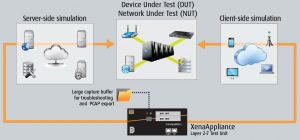
Network Infrastructure Test
The platform provides capacity and performance testing for service providers and large enterprise networks.
In this segment of testing, the focus is less on the individual forwarding devices and servers and more on the system-wide performance.
Examples of relevant parameters are optimal MSS, prioritization of different types of network traffic using Differentiated Services (DS) and other QoS mechanisms, and to verify guaranteed bandwidths according to SLAs. For carriers, testing is done to qualify performance before service roll out. Network infrastructure testing can also take place over large geographical distances requiring simultaneous control over several traffic generators.
Portable Testing Solution
XenaAppliance is a portable test solution that can be brought to the edges of the transport network for validation of network performance. Examples are the DSLAM/Central Offices for wired access technologies such as ADSL or data plane gateways for wireless networks such as UMTS or 4G.


